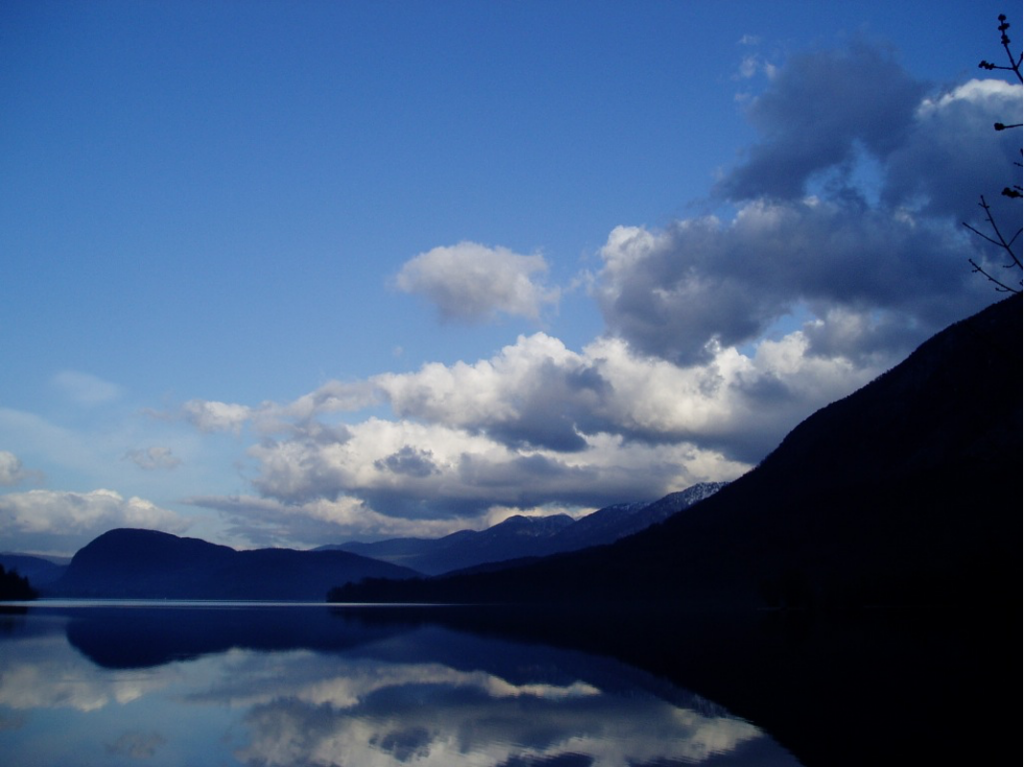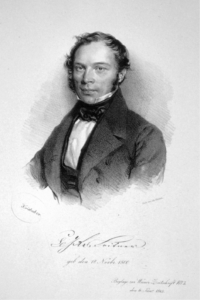Cloud and spring
(Poet's title: Wolke und Quelle)
Set by Schubert:
D 896B
[between autumn 1827 and early 1828]
Auf meinen heimischen Bergen,
Da sind die Wolken zu Haus,
Bin mitten innen gestanden
Und sah ins Tal hinaus.
Sie aber flogen von dannen,
Wie Schwäne so licht und leicht;
Wär’ gerne mit ihnen gezogen,
So weit der Himmel reicht.
Es drängte mich fort in die Fremde
Zur Ferne ein wilder Trieb;
Doch jetzt erscheinen mir Heimat
Und Nähe gar heilig und lieb.
Nun sehn ich mich nimmer ins Weite,
Hinaus ins nebelnde Blau;
Nun späh ich mit stillem Verlangen
Hinab in die schmale Au.
Was nickt dort unten am Fenster,
Und blühet wie Morgenlicht?
Ist’s ihre Ros’ am Gesimse,
Wie oder ihr holdes Gesicht?
Viel Glück, ihr Wolken, zur Reise!
Ich ziehe nimmer mit euch;
Was aber locket und lispelt
Da drüben im Lenzgesträuch?
Bist du es, Quelle, die flistert?
Ja, ja! ich eile mit dir;
Du kennst ja die kürzesten Wege
Hinunter, hinunter zu ihr!
On my local mountains
The clouds are at home,
I stood in the middle of them
And looked down into the valley.
But they flew away from there,
Like swans, so bright and light;
I would happily have gone with them
As far as the sky extended.
I felt a force driving me off abroad
To distant places, like a savage instinct;
But now my homeland has appeared in front of me,
And everything that is close by, so holy and beloved.
Now I never long to go far away,
Out into the misty blue;
Now, with a quiet longing, I peer
Down into the narrow meadow.
What is it nodding down there by the window,
And blossoming like the morning light?
Is it her rose on the window-sill
Or is it her beautiful face?
Clouds, good luck on your journey!
I shall never go off with you;
What is it that is beckoning and whispering
Over there in the spring foliage?
Is it you that is murmuring, oh spring?
Yes, yes, I shall hurry along with you;
You surely know the shortest route
Down, down to her!
All translations into English that appear on this website, unless otherwise stated, are by Malcolm Wren. You are free to use them on condition that you acknowledge Malcolm Wren as the translator and schubertsong.uk as the source. Unless otherwise stated, the comments and essays that appear after the texts and translations are by Malcolm Wren and are © Copyright.
☙
Themes and images in this text:
Blue Clouds Fields and meadows Heaven, the sky Home (Heimat) Leaves and foliage Longing and yearning Morning and morning songs Mountains and cliffs Near and far Roses and pink Spring (season) Springs, sources and fountains Swans Valleys Whispering Windows
It is interesting to compare Wolke und Quelle with the first Leitner poem that Schubert set to music: Drang in die Ferne (D 770):
Vater, du glaubst es nicht,
Wie’s mir zum Herzen spricht,
Wenn ich die Wolken seh’,
Oder am Strome steh’,
Wolkengold, Wellengrün
Ziehen so leicht dahin,
Weilen im Sonnenlicht,
Aber bei Blumen nicht.
Zögern und rasten nie,
Eilen als wüßten sie
Ferne und ungekannt
Irgend ein schön’res Land.
Ach! von Gewölk und Fluth
Hat auch mein wildes Blut
Heimlich geerbt den Drang,
Stürmet die Welt entlang!
Vaterlands Felsenthal
Wird mir zu eng, zu schmal;
Denn meiner Sehnsucht Traum
Findet darin nicht Raum.
Laßt mich! ich muss, ich muss
Fordern den Scheidekuss.
Vater und Mutter mein,
Müsset nicht böse seyn:
Hab’ euch ja herzlich lieb,
Aber ein wilder Trieb
Jagt mich waldein waldaus,
Weit von dem Vaterhaus.
Sorgt nicht durch welches Land
Einsam mein Weg sich wand,
Monden- und Sternenschein
Leuchtet auch dort hinein.
Überall wölbt’s Gefild’
Sich den azurnen Schild,
Den um die ganze Welt
Schirmend der Schöpfer hält.
Ach und wenn nimmermehr
Ich zu euch wiederkehr’,
Lieben, so denkt er fand
Glücklich das schön’re Land.
Father, you will not believe
How much it speaks to my heart
When I see the clouds
Or I stand by the river,
The gold of the clouds, the green of the waves,
They are pulled along so gently,
They hang about in the sunlight
But not amongst the flowers.
They never hesitate or rest,
They hurry on as if they were aware of
A distant and unexplored
Land somewhere else, a more beautiful land.
Oh! From the clouds and the flowing waters
My wild blood has also
Secretly inherited that urge
To storm through the world!
My fatherland’s valley enclosed by cliffs
Is becoming too narrow for me, too constricted;
For my dreams of longing
Cannot find any space within it.
Let me go! I have to, I must,
Request a farewell kiss.
Dear father and mother,
You mustn’t be angry:
I really love you with all my heart
Yet a savage instinct
Is chasing me into the forest and beyond,
Far from my paternal home.
Do not worry about which land
My solitary path is taking me towards,
The light of the moon and the stars
Will be shining down even there.
Everywhere is underneath that overarching
Azure shield
Which covers the whole world,
Held by the protecting arm of the creator.
And oh, if it happens that I never again
Return to you,
Dear ones, just tell yourself he found
Happiness in that more beautiful land.
In both texts the poet contemplates clouds and streams, both of which are moving in a way that he cannot. In both of them the clouds inspire ‘a savage instinct’ (ein wilder Trieb) to go off into faraway, unknown lands. In both texts he contrasts the open spaces high in and above the mountains (the domain of the clouds) with the narrow valley where he lives. The difference, though, is that in one the valley is seen as ‘too’ narrow. The word ‘schmal’ is applied to the valley in both texts but it is clear that in Drang in die Ferne this means something like ‘constricted’, whereas it has more positive associations in Wolke und Quelle. The valley limits his movements but it also offers security and reassurance. A word that can be translated as ‘constricted’ in one context in the other might be better translated as ‘cosy’.
A similar contrast applies to the running water. In Drang in die Ferne, the restless youth sees the river as leading away to new, unfamiliar lands and wants to join it and ‘storm through the world’. However, in Wolke und Quelle, the bubbling spring high in the valley leads him back to what is already familiar – his home and the person he loves.

Photo: Malcolm Wren
☙
Original Spelling Wolke und Quelle Auf meinen heimischen Bergen Da sind die Wolken zu Haus', Bin mitten innen gestanden, Und sah in's Thal hinaus. Sie aber flogen von dannen, Wie Schwäne so licht und leicht; Wär' gerne mit ihnen gezogen, So weit der Himmel reicht. Es drängte mich fort in die Fremde Zur Ferne ein wilder Trieb; Doch jetzt erscheinen mir Heimath Und Nähe gar heilig und lieb. Nun sehn' ich mich nimmer in's Weite, Hinaus in's nebelnde Blau; Nun späh' ich mit stillem Verlangen Hinab in die schmale Au. Was nickt dort unten am Fenster, Und blühet wie Morgenlicht? Ist's ihre Ros' am Gesimse, Wie oder ihr holdes Gesicht? Viel Glück ihr Wolken zur Reise! Ich ziehe nimmer mit euch; Was aber locket und lispelt Da drüben im Lenzgesträuch? Bist du es Quelle, die flistert? Ja, ja! ich eile mit dir; Du kennst ja die kürzesten Wege Hinunter, hinunter zu ihr!
Confirmed by Peter Rastl with Schubert’s source, Gedichte von Carl Gottfried Ritter von Leitner. Wien, gedruckt bey J. P. Sollinger. 1825, pages 165-166; and with Gedichte von Karl Gottfried Ritter v. Leitner. Zweite sehr vermehrte Auflage. Hannover. Victor Lohse. 1857, pages 106-107.
Note: Schubert only sketched an outline of the vocal part of this song, but neither wrote a title nor underlaid any text. Reinhard van Hoorickx identified the poem set by Schubert and suggested a completion of Schubert’s fragment.
To see an early edition of the text, go to page 165 here: https://download.digitale-sammlungen.de/BOOKS/download.pl?id=bsb10113663


